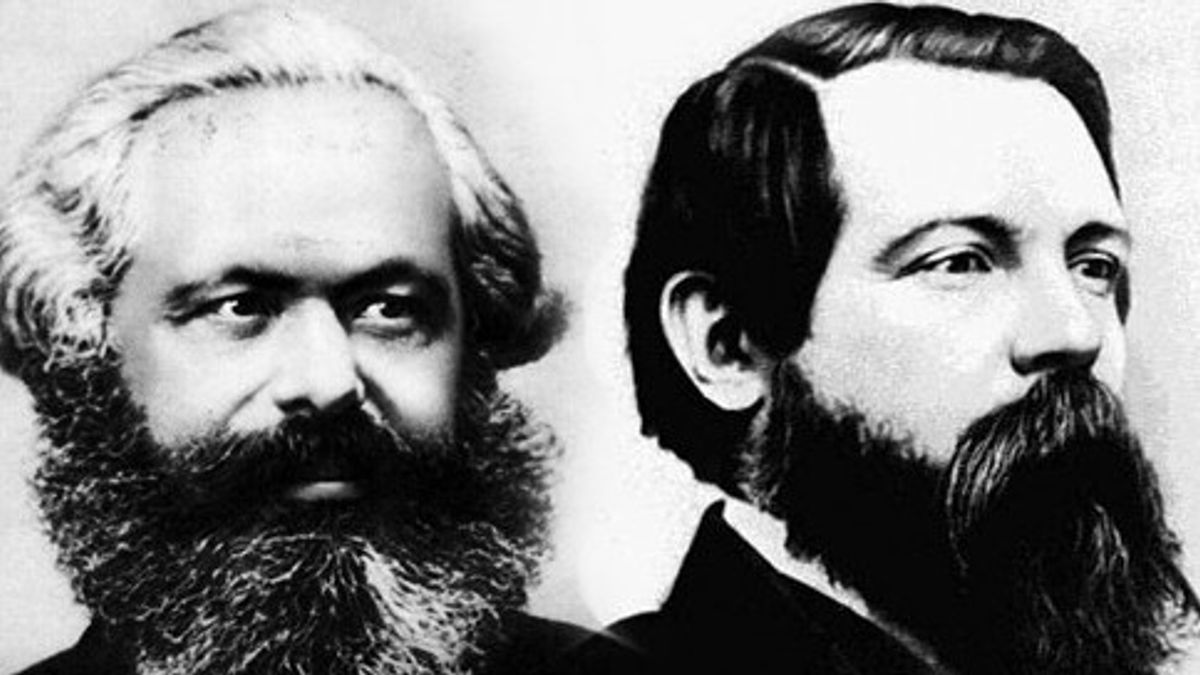JAKARTA - Today, February 21st, Karl Marx and his colleague Friedrich Engels published the book The Manifesto Komunis (hereinafter referred to as Manifesto). The 23-page pamphlet appeared on this date, 1848, in London. In the Manifesto, Marx's thoughts were written about the biggest socio-economic and political problems of his time. He then predicts what will happen next. Some of the predictions of both Marx and Engels came true.
One of the main points of the Manifesto was the call for the workers or proletarians to continue the class struggle. He explained that communism is the most advanced element in the working class movement and that this is in line with the struggle of the proletariat throughout the world. Meanwhile, communist ideology wants an abolition of property rights of the bourgeoisie and returns it to its original social character.
"The time has come that the Communists should openly with the whole world broadcast their views, their ideals, their aims, their traditions, and fight this childish tale about the Ghost of Communism with a manifesto of the party itself," wrote Marx. .
In the Manifesto, contained one of Marx's most famous statements: "The history of all existing societies up to the present day is the history of the class struggle." According to Marx, the formation of society cannot be separated from the conflict between the oppressors and the oppressed.
They carried out an unceasing class struggle, sometimes in secret, sometimes openly. Marx pointed out, in ancient Rome there were patricians, knights, plejebers, and slaves. Then in medieval times, there were the feudals, the vassals, the craftsmen, the servants, the poor, and the servants.
Tan Malaka in Madilog (1943) explains that the conflict between classes will in turn give birth to a new society. The era of slavery turned into a feudal or aristocratic era. Then the feudal age changed to the age of capitalism.
According to Tan, the era of slavery was a class conflict between slaves and masters. Then in the feudal era, there was a conflict between the nobles and the peasants. Then the class analysis that was first defined by Marx is the current era of Capitalism which is "the conflict between the workers and the capitalists," wrote Tan.
The opposition of the workers or the proletariat to the capital or the bourgeoisie can be said to be a new form of conflict for the time being in the social classes in modern society. In this Manifesto the categorization of social class is based on Marx's ownership of the means of production or Tan called it a tool.
The tools of today are owned by the powerful and the possessed. And tools become tools for the class struggle.
In the Manifesto it is explained that the opposition between the bourgeoisie and the proletariat will intensify. The expansion of the market, the massive decline in wages, wild competition between the bourgeoisie and the resulting economic crisis were the triggers. And a clash between these two classes is inevitable.
Therefore, in order to achieve its goal, the organization of the proletariat of the proletariat according to the Manifesto must synergize with the communist movement. This struggle is considered important in the context of resistance to the dangerous effects of capitalism predicted by Marx and Engels.
Proven predictions
What Marx predicted in the Manifesto about capitalism that would spread from country to country was proven. For example, globalization, which according to the analysis of Mohammad Zaki Arrobi, broadcast by Indoprogress, is a "cloak" of a combination of imperialism and international capitalism. The inflow of foreign capital into developing countries, the domination of multinational corporations in all sectors of life is referred to as the exploitation of capitalism in this century.
Then the predictions of Marx and Engels about the exploitative movement of the capital power (capital) resulted in the economic crisis becoming a reality. At least after the publication of the Manifesto to date, the world has experienced at least four times the global economic crisis.
The first crisis occurred not long after the release of the Manifesto, namely in the 1880s. Then it happened again in the 1920s, 1970s and most recently in 2008-2009.
Still according to Indoprogress, the impact of the global economic crisis in 2008 is still being felt today. Among them the global economic crisis had an impact on the collapse of the European economy. Greece and Spain also cannot be separated from being "victims" of the global economic crisis. These global economic crises even tend to recur within a certain period of time.
The English, Chinese, Japanese, Arabic, and French versions are automatically generated by the AI. So there may still be inaccuracies in translating, please always see Indonesian as our main language. (system supported by DigitalSiber.id)









